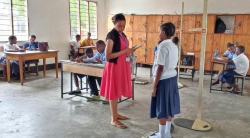
Formative assessment of the school-health environment and programs in Tanzania, Ethiopia, Sudan, Burkina Faso and South Africa.
Formative assessment of the school-health environment and programs in Tanzania, Ethiopia, Sudan, Burkina Faso and South Africa.
Adolescents make up approximately 16% of the world’s population, representing a significant demographic and socio-economic group. Approximately 90% of adolescents live in low- and middle-income countries (LMICs) and are significantly affected by injuries, undernutrition and obesity /overweight, HIV/AIDS, teenage pregnancy, and mental health illnesses. Early adolescence (10-14 years) is a particularly critical phase for research and intervention. Intervening through the education sector especially in schools where the majority of adolescents aged 10-14 can be found, provides an effective strategy for promoting healthy behaviors, and improving health.
AAPH has had region-wide experience with adolescent health survey as a leading institution of the Africa Research, Implementation Science and Education Network (ARISE Network). ARISE is a network for collaborative education and research activities in Africa established by Harvard T.H. Chan School of Public Health in partnership with AAPH and leading institutions and organizations across the African region. In June 2014, a foundational meeting was held in Boston, MA with all partners from education and research institutions from seven countries in Africa (Botswana, Ethiopia, Ghana, Nigeria, South Africa, Tanzania and Uganda) to discuss advancing coordinated and ARISE Members meeting in Jan 2016 collaborative education and research activities in order to address critical gaps in population health. The meeting afforded the opportunity to establish a network, which builds upon the numerous ongoing training and research activities among participating institutions - the ARISE Network. Network activities include discussions to prioritize and mapped out plans to advance purposeful and collaborative public health capacity building efforts with a focus on implementation science. Five out of the seven network members have implemented an adolescent health survey using a standard tool; findings from this baseline will form a foundation for a larger study in future. Based on this background, UNICEF Head Quarters Office has trusted AAPH with a Formative assessment of the school-health environment and programs in Tanzania, Ethiopia, Sudan, Burkina Faso and South Africa focusing on Adolescent Nutrition and Health.
AAPH is now taking lead on the formative assessment of the school health and food environment to better understand the policy surrounding school health environments, individual and population-level risk factors, and the current state of adolescent health, as are relevant to support the design, delivery and scale-up of high impact nutrition and health interventions through schools. This study aims to assess the school health and food environment on three levels: (i) policy environment and existing interventions, (ii) the school food environment, and (iii) the state of nutrition and health for in-school adolescents ages 10-14.
AAPH will disburse project funds and supervise implementing partners conducting a mixed-methods assessment of adolescent nutrition, health and school food environments in five African urban areas; Dar es Salaam, Khartoum, Addis Ababa, Naona, and Durban. The field implementing partners are; Addis Continental Institute of Public Health – Ethiopia, Ahfad University for Women – South Sudan, Nauna Health Research Center – Bukina Faso, and University of Kwazulu-Natal – South Africa. Other implementing partners are Harvard School of Public Health – US and Heidelberg University – Germany.
